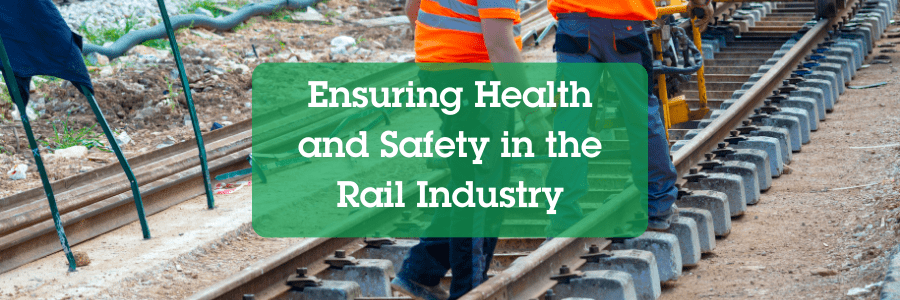Ensuring Health and Safety in the Rail Industry
The role of the Rail Industry
The railway system has played a pivotal role in the development of Great Britain’s infrastructure and economy for centuries. It remains a crucial mode of transportation, facilitating the movement of passengers and goods across the country. However, the operation and maintenance of railways involve inherent risks that can jeopardise the safety and health of both employees and the public. To mitigate these risks, stringent health and safety measures are paramount. The rail industry has made significant strides in prioritising health and safety, implementing comprehensive measures to prevent accidents, protect workers, and provide a secure environment for passengers. Start protecting your workers today with the IOSH Managing Safely in Rail exclusively offered by SHEilds.
Challenges and risks
Despite the stringent rules and regulations in place, the rail industry faces several challenges in maintaining health and safety standards. One significant challenge is the sheer complexity of the rail network, comprising various components such as tracks, stations, rolling stock, and signalling systems. Each element presents unique health and safety concerns, making a comprehensive approach crucial. Additionally, the industry must contend with the potential for accidents caused by factors such as adverse weather conditions, human error, and technical failures. These challenges highlight the need for constant vigilance and adaptation to evolving health and safety risks.
Worker safety
The well-being of rail industry employees is a paramount concern. Rail workers face a range of hazards, from working near moving trains, to handling heavy equipment and working at height during maintenance and construction activities. To mitigate these risks, train operators invest in rigorous training programs that equip employees with the necessary skills to perform their duties safely.
One such programme developed by the Rail Safety Standards Board (RSSB) was the development of a Non-Technical Skills (NTS) training programme. NTS are all about those personal skills that workers need to have that will help them undertake their roles safely, efficiently, and effectively. There is evidence that suggests that NTS can have a real impact on improving both performance and health and safety. The RSSB undertook a review of the potential benefits of NTS, findings included a rail company in Canada reporting a 46% reduction in accidents involving human error, after utilising NTS. Personal Protective Equipment (PPE) and safety protocols are also integral to minimising the potential for accidents.
Passenger safety
Passenger safety is equally vital, given the millions of people who rely on the rail network daily. Rail operators implement a variety of measures to ensure passenger security, including clear signage, emergency procedures, and public awareness campaigns. The design and maintenance of rolling stock and station facilities also prioritise ease of movement, accessibility, and emergency evacuation.
Innovative solutions
The rail industry continually seeks innovative solutions to enhance health and safety. Technology plays a pivotal role in this endeavour. For instance, the deployment of sensors and monitoring systems along tracks can detect anomalies in real time, allowing operators to proactively address potential issues before they escalate into safety hazards.
Regulatory framework
The rail industry operates under a robust regulatory framework designed to safeguard the well-being of passengers and workers alike. The primary regulatory body in Britain is the Office of Rail and Road (ORR), responsible for enforcing safety standards and overseeing compliance. Additionally, the Rail Safety and Standards Board (RSSB) plays a vital role in developing industry standards, sharing best practices, and facilitating collaboration among stakeholders.
The latest ORR “Annual Report of Health and Safety on Britain’s Railways”, issued in July 2003, includes the following findings:
- Network Rail has been working on action plans focused on improving the management of earthworks and drainage, originating from recommendations following the Carmont accident in 2020, where sadly 3 passengers died because of a train being derailed after hitting a landslip.)
- Positive actions taken by Network Rail in the past year, including improving safety for track workers in lookout roles and working on overhead lines.
- Concern about managing fatigue of workers. The regulator said it was encouraged by Network Rail’s recognition that its own fatigue controls required improvement, adding that it intended to issue revised guidance to the sector setting out its clear expectations and understanding of the law. The report stated that “a safe railway also relies on its workers to be at optimum performance, so it is of paramount importance that industry reduces fatigue levels.”
- The Chief Inspector of railways stated “Financial challenges, changes to travelling and working patterns, weather extremes and industrial action have brought uncertainty to the rail industry, but Great Britain’s railways consistently perform as one of the safest in Europe.
Also, in their annual report, the ORR included a case study into the investigation of SPADs (Signals Passed At Danger.) The key findings are set out below.
Case Study 1: Effective SPAD investigations
ORR proactive inspections of SPAD management looked at three areas:
- How drivers manage their own professional competence
- The competence management systems for driver managers
- The tools and techniques used to understand the underlying causes of SPAD incidents.
ORR found, through their assessments of SPAD investigations, that organisations embracing and supporting an understanding of non-technical skills (NTS) for drivers and driver managers had a better understanding of why SPADs occurred and what support is needed for a driver to prevent a recurrence.
NTS are social, cognitive, and personal skills that can enhance the way technical skills, tasks and procedures are carried out, and include:
- Situational awareness
- Communication
- Decision-making and actions
- Co-operation and working with others
- Workload management
- Self-management




